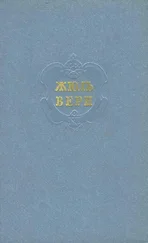Notwithstanding, then, the extreme lowness of the temperature, the little population found that they were able to move about in the open air with perfect immunity. The governor general made it his special care to see that his people were all well fed and warmly clad. Food was both wholesome and abundant, and besides the furs brought from the Dobryna’s stores, fresh skins could very easily be procured and made up into wearing apparel. A daily course of out-door exercise was enforced upon everyone; not even Pablo and Nina were exempted from the general rule; the two children, muffled up in furs, looking like little Esquimeaux, skated along together, Pablo ever at his companion’s side, ready to give her a helping hand whenever she was weary with her exertions.
After his interview with the newly arrived astronomer, Isaac Hakkabut slunk back again to his tartan. A change had come over his ideas; he could no longer resist the conviction that he was indeed millions and millions of miles away from the earth, where he had carried on so varied and remunerative a traffic. It might be imagined that this realization of his true position would have led him to a better mind, and that, in some degree at least, he would have been induced to regard the few fellow-creatures with whom his lot had been so strangely cast, otherwise than as mere instruments to be turned to his own personal and pecuniary advantage; but no—the desire of gain was too thoroughly ingrained into his hard nature ever to be eradicated, and secure in his knowledge that he was under the protection of a French officer, who, except under the most urgent necessity, would not permit him to be molested in retaining his property, he determined to wait for some emergency to arise which should enable him to use his present situation for his own profit.
On the one hand, the Jew took it into account that although the chances of returning to the earth might be remote, yet from what he had heard from the professor he could not believe that they were improbable; on the other, he knew that a considerable sum of money, in English and Russian coinage, was in the possession of various members of the little colony, and this, although valueless now, would be worth as much as ever if the proper condition of things should be restored; accordingly, he set his heart on getting all the monetary wealth of Gallia into his possession, and to do this he must sell his goods. But he would not sell them yet; there might come a time when for many articles the supply would not be equal to the demand; that would be the time for him; by waiting he reckoned he should be able to transact some lucrative business.
Such in his solitude were old Isaac’s cogitations, whilst the universal population of Nina’s Hive were congratulating themselves upon being rid of his odious presence.
As already stated in the message brought by the carrier pigeon, the distance traveled by Gallia in April was 39,000,000 leagues, and at the end of the month she was 110,000,000 leagues from the sun. A diagram representing the elliptical orbit of the planet, accompanied by an ephemeris made out in minute detail, had been drawn out by the professor. The curve was divided into twenty-four sections of unequal length, representing respectively the distance described in the twenty-four months of the Gallian year, the twelve former divisions, according to Kepler’s law, gradually diminishing in length as they approached the point denoting the aphelion and increasing as they neared the perihelion.
It was on the 12th of May that Rosette exhibited this result of his labors to Servadac, the count, and the lieutenant, who visited his apartment and naturally examined the drawing with the keenest interest. Gallia’s path, extending beyond the orbit of Jupiter, lay clearly defined before their eyes, the progress along the orbit and the solar distances being inserted for each month separately. Nothing could look plainer, and if the professor’s calculations were correct (a point upon which they dared not, if they would, express the semblance of a doubt), Gallia would accomplish her revolution in precisely two years, and would meet the earth, which would in the same period of time have completed two annual revolutions, in the very same spot as before. What would be the consequences of a second collision they scarcely ventured to think.
Without lifting his eye from the diagram, which he was still carefully scrutinizing, Servadac said, "I see that during the month of May, Gallia will only travel 30,400,000 leagues, and that this will leave her about 140,000,000 leagues distant from the sun."
"Just so," replied the professor.
"Then we have already passed the zone of the telescopic planets, have we not?" asked the count.
"Can you not use your eyes?" said the professor, testily. "If you will look you will see the zone marked clearly enough upon the map."
Without noticing the interruption, Servadac continued his own remarks, "The comet then, I see, is to reach its aphelion on the 15th of January, exactly a twelvemonth after passing its perihelion."
"A twelvemonth! Not a Gallian twelvemonth?" exclaimed Rosette.
Servadac looked bewildered. Lieutenant Procope could not suppress a smile.
"What are you laughing at?" demanded the professor, turning round upon him angrily.
"Nothing, sir; only it amuses me to see how you want to revise the terrestrial calendar."
"I want to be logical, that’s all."
"By all manner of means, my dear professor, let us be logical."
"Well, then, listen to me," resumed the professor, stiffly. "I presume you are taking it for granted that the Gallian year—by which I mean the time in which Gallia makes one revolution round the sun—is equal in length to two terrestrial years."
They signified their assent.
"And that year, like every other year, ought to be divided into twelve months."
"Yes, certainly, if you wish it," said the captain, acquiescing.
"If I wish it!" exclaimed Rosette. "Nothing of the sort! Of course a year must have twelve months!"
"Of course," said the captain.
"And how many days will make a month?" asked the professor.
"I suppose sixty or sixty-two, as the case may be. The days now are only half as long as they used to be," answered the captain.
"Servadac, don’t be thoughtless!" cried Rosette, with all the petulant impatience of the old pedagogue. "If the days are only half as long as they were, sixty of them cannot make up a twelfth part of Gallia’s year—cannot be a month."
"I suppose not," replied the confused captain.
"Do you not see, then," continued the astronomer, "that if a Gallian month is twice as long as a terrestrial month, and a Gallian day is only half as long as a terrestrial day, there must be a hundred and twenty days in every month?"
"No doubt you are right, professor," said Count Timascheff; "but do you not think that the use of a new calendar such as this would practically be very troublesome?"
"Not at all! not at all! I do not intend to use any other," was the professor’s bluff reply.
After pondering for a few moments, the captain spoke again. "According, then, to this new calendar, it isn’t the middle of May at all; it must now be some time in March."
"Yes," said the professor, "to-day is the 26th of March. It is the 266th day of the Gallian year. It corresponds with the 133d day of the terrestrial year. You are quite correct, it is the 26th of March."
"Strange!" muttered Servadac.
"And a month, a terrestrial month, thirty old days, sixty new days hence, it will be the 86th of March."
"Ha, ha!" roared the captain; "this is logic with a vengeance!"
The old professor had an undefined consciousness that his former pupil was laughing at him; and as it was growing late, he made an excuse that he had no more leisure. The visitors accordingly quitted the observatory.
Читать дальше
![Жюль Верн Off on a Comet [Hector Servadac] обложка книги](/books/30131/zhyul-vern-off-on-a-comet-hector-servadac-cover.webp)










![Жюль Верн - Властелин мира [сборник]](/books/407848/zhyul-vern-vlastelin-mira-sbornik-thumb.webp)
